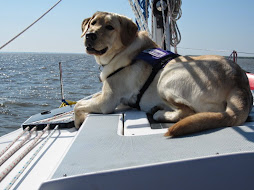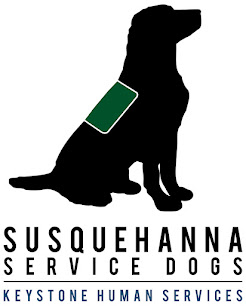SSD Queen Mab’s eyes drooped from her puppy massage at the
start of puppy class, but once it was time to work, she snapped to attention.
We always start our puppy classes with puppy massage. Puppy class
can be very exciting for a dog because they get to see other dogs that they
haven’t seen in a while. Puppy massage is a way to calm them down, resulting in
a relaxed pup that can focus on the cues its puppy raiser gives it.
In yesterday’s puppy class, we started preparing for the
types of things that might appear on the end of semester evaluations. Three of
the cues were “fix,” “visit,” and “back.”
“Fix” is useful when a dog gets tangled in the leash. On the
cue “fix,” the dog will lift its paws until its legs aren’t tangled in the
leash anymore.
“Visit” is an excellent way to bring the dog closer to you,
and it’s one of the cues that all of our dogs need to know. On cue, the dog
puts its chin in a person’s hand or on their lap and holds it there for an
indefinitely amount of time.
Watch SSD Nook start to learn “visit.” Her puppy raiser
clicks as soon as Nook’s chin hits her hand. When Nook experiments and tries
jumping, her puppy raiser quickly moves her hand away.
Watch SSD Queen Mab practice “visit.” Notice that when Mab
wiggles her head around, her puppy raiser pulls her hand back, waits for Mab to
settle, and then presents her hand again. Also notice that by the end of the
video, her puppy raiser is asking for a visit by placing her open palm on her
lap. This is the first step to getting Mab to do “visit” by putting her head on
her puppy raiser’s lap without the hand signal.
Next we practiced “back,” another cue that all of our dogs
need to know. Our goal is to have the dog walk backwards in a straight line. To
train this cue, we start with the dog in a chute so that the dog can only move
backward. When the dog takes a step back, we click and treat. Gradually, we
hold the click until the dog is taking more steps back. Once the dog is
consistently walking backward, we move out of the chute to practice.
We don’t add the cue “back” until the dog can consistently
take seven steps backward in the middle of a room. Why seven steps? That’s the
approximate number of steps a dog will need to take to open a door using a pull
strap. (The dog grabs the pull strap that’s attached to the door, pulls, and
backs up.)
Watch SSD Beaker take a few steps back while he’s in a
chute.
SSD Falstaff moves backward while his puppy raiser stands
still at the front of the chute.
SSD Honeydew loves the cue “back.” Watch her enthusiasm as
she trots backward for her puppy raiser.
We closed out the class with a game that we call “Puppy 911.”
Our puppy raisers and dogs form two teams, each behind a bucket of water. Puppy
raisers need to fill a cup with water and dump it in a bucket several feet
away, all while their puppy walks on a loose leash. To add an extra challenge,
puppy raisers had to hold the cup of water and the leash in the same hand.
The Puppy 911 game is great experience for the dog because
they get to practice loose leash walking in an exciting situation. And just
think: If a puppy raiser can hold the leash and carry a cup of water with
spilling, then that dog’s future partner will be able to hold the leash and
carry a cup of coffee from the cashier to their table in a coffee shop.









wow! I can't believe how big Queen Mab is!! I remember seeing her as sleepy puppy at Susan's when I went to her home to puppy hug! She certainly is growing into a beautiful girl! Congrats Susan for getting Queen Mab, she certainly is a queen <3
ReplyDelete